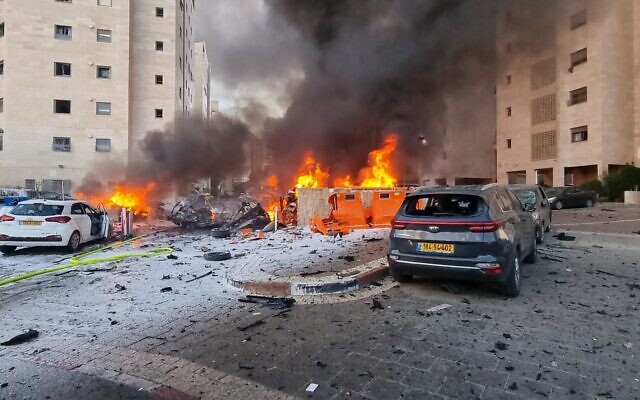
Hamas’s recent major terrorist strike in Israel represents a significant turning point in the Israel-Palestine conflict, as this attack was perhaps the largest since the 1973 Yom Kippur War and challenged Israel’s long standing reputation for stringent security. Hamas, an Islamist radical outfit focused primarily on the Palestinian cause, has drawn international attention with its audacious actions. Hamas’s multifaceted stance combines pro-Palestine and Islamist principles with a preference for resistance over diplomacy, opposing a two-state solution. While the Palestine cause has been less prominent recently, it has remained central in the propaganda produced by groups like Al-Qaeda and ISIS. Following the Hamas attack, regional jihadist groups expressed support and blamed Israel for the violence. Israel’s domestic politics, including matters related to the Al Aqsa Mosque in Jerusalem, have brought increased focus to the Israel-Palestine issue in recent months. Israel’s leadership’s equation of Hamas with ISIS broadens the IDF’s counterterrorism mandate. However, intra-jihadist rivalries and differing interests divide Islamist groups. The world is now closely watching Israel’s response as it harbours the potential of causing strategic shifts in the wider region as a result. Hamas remains a regional and Palestine-centric group which attracts the backing of other Islamist networks.
The attack’s scale and coordination have elevated Hamas to the status of a quasi-military force, and the planning of the operation follows the rules of modern guerrilla warfare. Regional reactions to the crisis vary, with some countries calling for a two-state solution, while others reassess or calibrate their relationships with Israel. The attack challenges recent geoeconomic initiatives in the region and impacts public opinion in Arab states that traditionally support the Palestinian cause. Israel’s response to the situation will affect the future of West Asia and the evolution of international relations.
In the intricate landscape of Palestinian politics, the prominent militant group Hamas has witnessed a remarkable resurgence in popularity among the Palestinian populace. This is attributed to several key factors reshaping the region’s political dynamics. Chief among these is the refusal of Palestinian President Mahmoud Abbas to hold long-awaited elections, leaving Palestinians disillusioned and in search of alternatives. The enduring political division between Hamas-controlled Gaza and the Palestinian Authority-administered West Bank has created a void that Hamas is adeptly filling, amplifying its appeal as a political force. Simultaneously, the United States’ increased aid to the Palestinian administration in the West Bank, intended to bolster Mahmoud Abbas and his unpopular government, has yielded mixed results, failing to address the core political disenchantment and aspirations that underpin the growing support of Hamas among Palestinians.
Trump’s Impact: The Catalyst for Hamas’ Resurgence
During Donald Trump’s presidency, the rise of Hamas as a prominent political force in Palestinian territories can be attributed to the prevailing sense of despair among Palestinians. Trump’s unorthodox approach to the Israeli-Palestinian conflict, which significantly diverged from his predecessors, had a profound and lasting impact on the region’s political dynamics and Palestinian sentiments. Key moments from Trump’s tenure intensified this prevailing feeling of helplessness, including the controversial relocation of the U.S. Embassy to Jerusalem in 2018, a departure from established international consensus, and the unveiling of the “Deal of the Century” in 2020, widely perceived as favoring Israel and deepening Palestinian disillusionment. Furthermore, the normalization agreements between Arab states and Israel exacerbated the isolation of Palestinians, and the reduction of U.S. financial aid compounded their sense of abandonment. In this climate, Hamas emerged as a symbol of resistance and a proactive alternative for those dissatisfied with diplomatic efforts. The group’s unwavering commitment to the Palestinian cause and resilience against Israeli occupation struck a chord with those seeking a more assertive approach.
Israel’s Security Landscape
Termed as Israel’s “9/11 moment,” this audacious attack is poised to reshape Israel’s security approach and regional strategy. The intelligence failure, belyingIsrael’s reputation for robust security, has eroded the confidence in its perceived invulnerability. The attack’s meticulous planning and the extent of the infiltration by Palestinian fighters are unprecedented, profoundly impacting Israeli society. Israel’s Prime Minister Netanyahu anticipates a “long and difficult war.” This conflict goes beyond local implications, with global and regional consequences affecting strategic alliances and Middle Eastern power dynamics. In this turbulent environment, non-state actors exploiting technology and state support require adaptive security measures in response. Israel faces a crucial need to reevaluate its military and political strategies in the aftermath of this monumental multi-pronged assault.
Hamas Attack and Geoeconomic Landscape
This ongoing war has raised concerns about potential destabilisation and its implications for the evolving socio-political and economic landscape in West Asia. Recent progress, including the normalization of relations between Israel and some Arab states, now faces uncertainty. Geopolitical challenges, coupled with fluctuations in global oil prices, further complicate the situation. This attack highlights the persistent centrality of the Palestinian issue as a fault line in the region, capable of disrupting regional integration initiatives. Balancing top-down policy decisions with the sudden and intense arousal of public opinion about this crisis is essential for the long-term stability and economic development of the Middle East, even though the challenges of achieving a two-state solution remain formidable.
Lessons from Hamas’s Low-Tech Breach
The recent audacious breach of Israeli defences in Gaza serves as a stark reminder of the ever-evolving nature of warfare and the sheer inventiveness of those who engage in it. In this striking episode, Hamas orchestrated this breach with remarkable efficiency, making use of low-tech, unconventional means. Their clandestine teams, operating with military precision, underwent specialised training to breach the Gaza-Israel border fence, catching the highly sophisticated Israeli defense apparatus off-guard. What’s particularly intriguing about this incident is how motivation, that unquenchable desire to prevail, played a key role, especially when facing a much more powerful adversary. This incident serves as a crucial message for Indian defense Forces, highlighting the imperative need for a collaborative approach between public and private sectors to harness cutting-edge military technologies and cost-effective innovations in preparation for countering potential adversaries, such as Pakistan and China, celebrated for their skillful use of unorthodox strategies.






Add comment